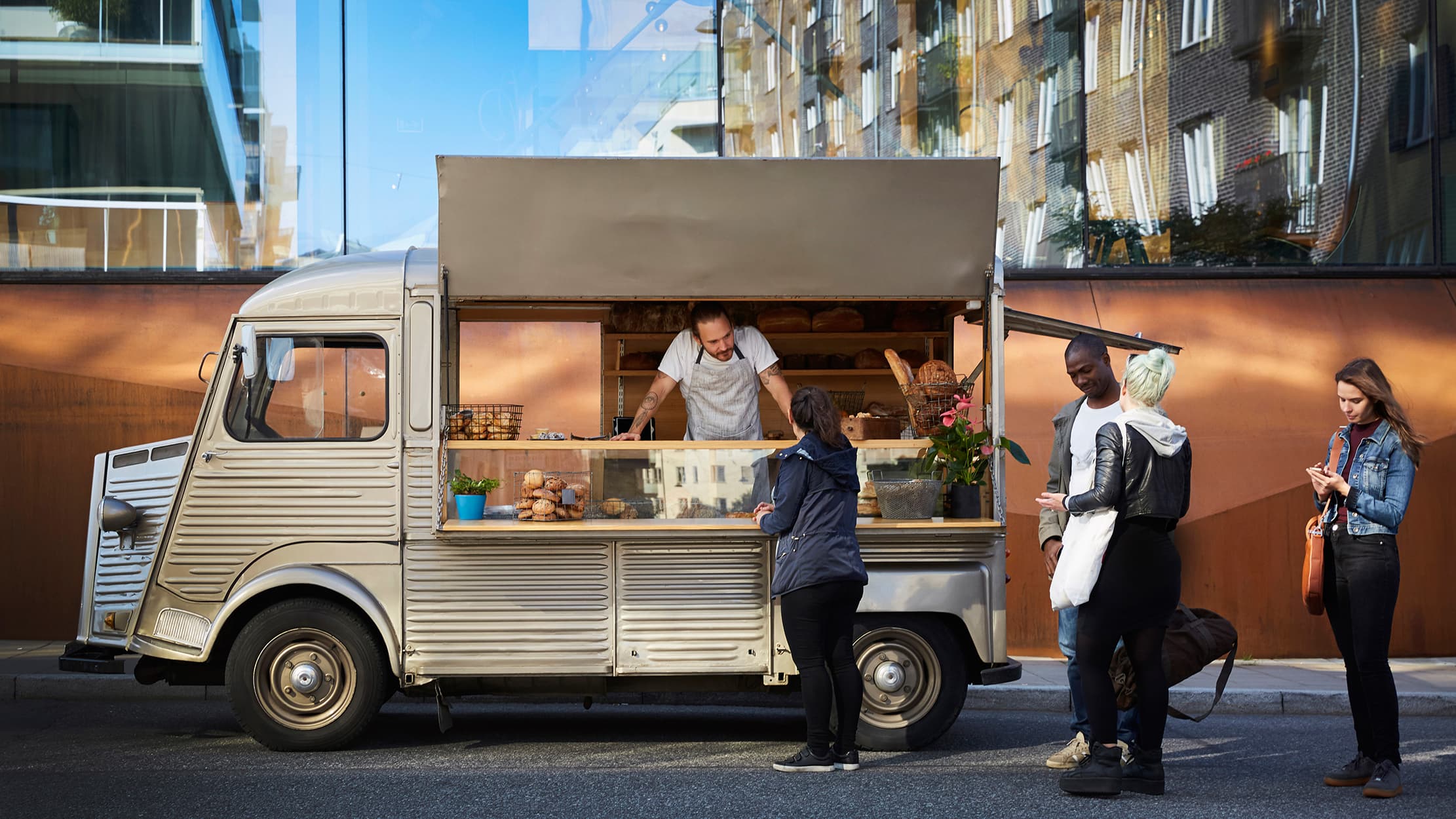Food trucks are growing in popularity, and it’s not hard to understand why.
The fact that they’re significantly cheaper to launch than a brick and mortar restaurant, with more freedom to create your own unique business model, is enticing both newcomers and seasoned restaurateurs.
But how much does it cost to start a food truck business? As you might imagine, that depends on a number of factors, but the average cost of starting a food truck can range from around £5,000 to £50,000.
Use our free worksheet to break down how much it might cost to start a food truck, based on your circumstances.
Here’s what we’ll cover:
Breaking down food truck startup costs
The average food truck startup costs can vary dramatically depending on how big you want your operation to be, the location you wish to serve, and a range of smaller choices you’ll need to make.
And of course, there’s the actual truck—are you going to rent or own? There are benefits to both, but keep in mind that buying a quality truck outright can be expensive.
When working out the fixed and variable costs to start a food truck, it can be useful to break down one-time costs as well as ongoing food truck expenses, to get a clear picture of both the initial and ongoing investments needed.
One-time food truck expenses and costs
Understanding how much money you’ll need to start a food truck includes having a realistic view of the initial one-time costs it’ll take to get your business up and running.
When considering these capital investments, bear in mind that you won’t be making a profit right away, so you’ll need to have a cushion of money in the bank to sustain your business as it gets rolling.
We’ve outlined some initial average startup cost for a food truck below, that you’ll want to consider.
Permits and licencing fees
You’ll need a business licence or certificate, which can range from around £100 to £500 or more depending on your location, as well as a street trading licence, which can cost hundreds of pounds.
To get a food premises approval, you might have to organise a visit from the Food Standards Agency, which costs £395.40.
You might also need various other licences and permits, including a health permit, a fire permit, and an alcohol licence (if you plan to sell alcohol).
Check with your local council to find out exactly which permits and licences you’ll need and how much they will cost you.
The truck
For those who opt to buy their truck rather than rent, this may be the biggest initial expenditure you make.
Expect to pay anywhere from £5,000 to £50,000 for a new food truck, complete with fittings and equipment, while second-hand options start from around £1,000.
Research your food truck and find out what’s included if you’re planning to buy it.
The costs you allot for the truck should include the truck itself, a custom paint job (if needed), as well as the kitchen and serving equipment (if it’s not included with the truck).
Although second-hand and other more affordable trucks can minimise your initial spend, it’s worth considering a newer truck if you can afford it.
Cutting corners when purchasing the truck could be a false economy if you end up forking out a small fortune on costly repairs, like replacing the engine, transmission, tires, etc.
Initial food and drink inventory
You’re going to have to stock up for your grand opening—and beyond.
The cost of your inventory will depend on what you’re planning to serve, but it’s a good idea to budget for several weeks’ worth of supplies to begin with.
Expect to set aside on average £1,000-£5,000 to cover a startup supply of food, drink, packaging, and other disposable supplies like plates, bowls, napkins, cups, cutlery, etc.
Register/Point of Sale (POS) solutions
Of course, you’ll need a way to get paid and keep track of those payments.
Handheld card readers are typically £20-£200 each, while a countertop terminal or full till system might cost you from around £250 to over £1,000.
To save some money at the start, you can use a tablet with a credit card reader, rather than springing for a more intricate system.
Equipment
Some of the essential equipment you’ll need for your mobile kitchen might come with the food truck, including pots, pans, cooking appliances, fridge, storage, counters, and a generator.
But if not, you’ll have to purchase this yourself.
On average, you can expect to spend around £5,000 to £20,000 on equipment.
Uniforms/t-shirts
This one is optional and depends on how many employees you’ll have, but it’s a good idea to have some degree of uniformity if you want to look professional.
You can wear your own clothes for £0, spend a couple of hundred pounds on branded t-shirts and aprons, or splash out for something more elaborate, budget allowing.
Fire extinguisher
Grease fires can happen in a food truck, and you don’t want to see your investment go up in smoke. Additionally, permits may expect you to have a fire extinguisher in your truck.
Look for a fire extinguisher designed to fight most types of small household and kitchen fires (grease, electrical, etc.), with costs starting from as little as around £20.
Contingency and miscellaneous expenses
You never know what issues might crop up as you build your business, so it’s good to have some buffer money set aside.
Your contingency budget will depend a bit on the size your operations, but typically it would range from around £5,000 to £60,000.
It’s a good idea to have enough to cover at least a few months of running costs.
Food truck monthly expenses and recurring costs
As your food truck develops, you’re going to have some daily, monthly and annual costs to take care of—and these have a pretty big range depending on the type of truck.
No matter what, it’s always a good idea to shop around for the best rates, so make sure you do your research when budgeting for your longer term food truck startup costs.
Commissary fees
If you need to rent a commercial kitchen space to prepare your food in, this can easily cost from around £400 to £1,500 per month.
Food truck insurance costs
Catering insurance for food trucks can cover things like public liability, employers’ liability, business equipment, stock, personal injury, and legal expenses.
The average catering insurance for a sole trader with a mobile van starts from around £68 per year.
However, you may need more comprehensive cover and even quotes at the lower end of the scale will vary widely depending on your specific business circumstances.
You’ll also need commercial vehicle insurance, which can cost from around £500 per year, and it’s worth considering breakdown cover if this isn’t included with your commercial vehicle cover.
Some specialised insurers can offer policies designed for food trucks and catering vans, combining commercial vehicle and catering insurance with breakdown cover.
Food, beverages, and disposable supplies
You’ll be paying out regularly to replenish your supply of food, drink, packaging, and other food-related disposable supplies.
Cost depends on what you’re selling and how much of it.
But typically these costs might sit at around £2,000-£15,000 per month or 30-35% of your food sales, including topping up on supplies like plates, cups, bowls, cutlery, napkins, etc.
Fuel and maintenance
Depending on how far you travel and how long you stay open, you can expect to spend about £200-£500 per month on fuel and maintenance.
Social marketing
Social media is your friends. This one is a rare freebie on the cost sheet, so take advantage of it and build your following.
Website
Social media can only take you so far. A professional website will set you apart from competitors.
Expect to pay at least £500 for something very simple, and up to £10,000 or more for a sophisticated, mobile-responsive site—plus domain costs to maintain it.
POS software
When it comes to POS and payment software, there are basic pay-as-you-go apps you can use for free—or you can invest in a more sophisticated solutions, ranging from around £20 to £200+ per month.
Business Wi-Fi / internet
You could consider a pay-as-you-go data SIM with a mobile hotspot (MiFi) for around £65-£95, or a 4G-5G router with a data plan, potentially costing from £30 upwards.
Staff salaries
This one really depends on your particular set-up. If it’s just you and a partner doing all the work, cross it off the list—you’re both taking it for the team.
If you have employees, you are legally obliged to pay at least the National Minimum Wage hourly rate for apprentices and anyone aged under 21, and the National Living Wage hourly rate for anyone who’s 21 or over.
Common food truck startup myths & mistakes
There’s a lot of information floating around about opening up a food truck and the average startup costs involved.
Unfortunately, that means there’s also a lot of misinformation. So, we’ve decided to take some of the most commonly discussed food truck startup myths and mistakes and give you the real scoop.
- Mind the licencing and permitting process. Bottom line: all your business-related licences and permits must be current and up-to-date. Make sure you do your research and find out the exact requirements for operating in your area of choice. Contact the council(s) you plan to do business in and make sure you have all the right licences and permits, or risk hefty fines and potential closure.
- Find the right events. And make sure you’ll have a spot when you get there! New food truckers might not realise that there are usually waiting lists for popular events—and they can stretch up to years in advance. Get in touch with the organisers to secure your spot. And don’t forget to find out the associated fees.
- Don’t skimp on the truck. Too often, food truck owners starting out try to cut corners, but it you’re not smart about your choices, it can end up costing you dearly. Our advice: spend as much as you can realistically afford on your truck. Mechanical problems down the line can end up costing a lot more than buying a truck that’s in good condition to start with.
- Take advantage of social media. Not many things come free in this world, so make sure you take advantage of these free marketing channels. It’s easy to overlook the power of social media when you’re busy running your truck, but it can play an important role in building your business. Giving you the ability to connect with potential customers, offer specials, and announce where you’ll be next, social media is key to generating buzz around your truck.
Food truck startup costs: Industry tip
Running a business is hard work, so don’t get bogged down tracking your food truck expenses. Use free accounting software to simplify your financial admin and minimise costs.
Or, consider upgrading to affordable accounting software for small to medium businesses with Sage Accounting.
How to use the food truck startup cost worksheet
Our food truck startup cost spreadsheets are easy and intuitive to use. Once downloaded, they’re fully customizable to fit your needs.
- Download the free food truck budget template.
- Add or remove fields applicable to your startup.
- Assess your needs and related costs.
- Make a note of costs that might change or costs to be determined.
- Plug in your numbers and enjoy the simplified breakdown of your startup and ongoing costs.
Sage lets you focus on building your business, not tracking expenses
Working out how much it will cost to start a food truck is only the first step. Opening and maintaining your food truck business takes a lot.
Day in and day out you invest your time, energy and focus into creating something great. So why waste your valuable time and efforts tracking expenses the old-fashioned way?
Administrative tasks can now be fully automated—so upgrade your business model with Sage Accounting.
You have enough on your plate and our online accounting software can save you time and money. Outsource the busy work and get back to doing what you do best—making your business a success.
Additional startup cost templates
Is our sample food truck startup cost calculator not what you’re looking for? Please check out our other templates. We also offer solutions for all of your startup needs.
Important information about these food truck start up costs
The startup costs shown here by industry are merely guidelines and average estimates based on information pulled from a variety of sources. While we have attempted to present the most accurate information available, please be aware that startup costs can vary greatly according to a number of factors, including but not limited to your location, local fees, and contractor quotes. The information presented here is intended to help guide prospective business owners in the search for information on starting a business within a given industry, but should not be interpreted as an exact quote.
Sage provides the information contained here as a service to the public and is not responsible for, and expressly disclaims all liability for damages of any kind arising out of use of, reference to, or reliance on any information contained on this site. While the information contained on this site is periodically updated, no guarantee is given that the information provided is correct, complete, and up-to-date. Sage is not responsible for the accuracy or content of information contained on this site.
News
Berita
News Flash
Blog
Technology
Sports
Sport
Football
Tips
Finance
Berita Terkini
Berita Terbaru
Berita Kekinian
News
Berita Terkini
Olahraga
Pasang Internet Myrepublic
Jasa Import China
Jasa Import Door to Door




